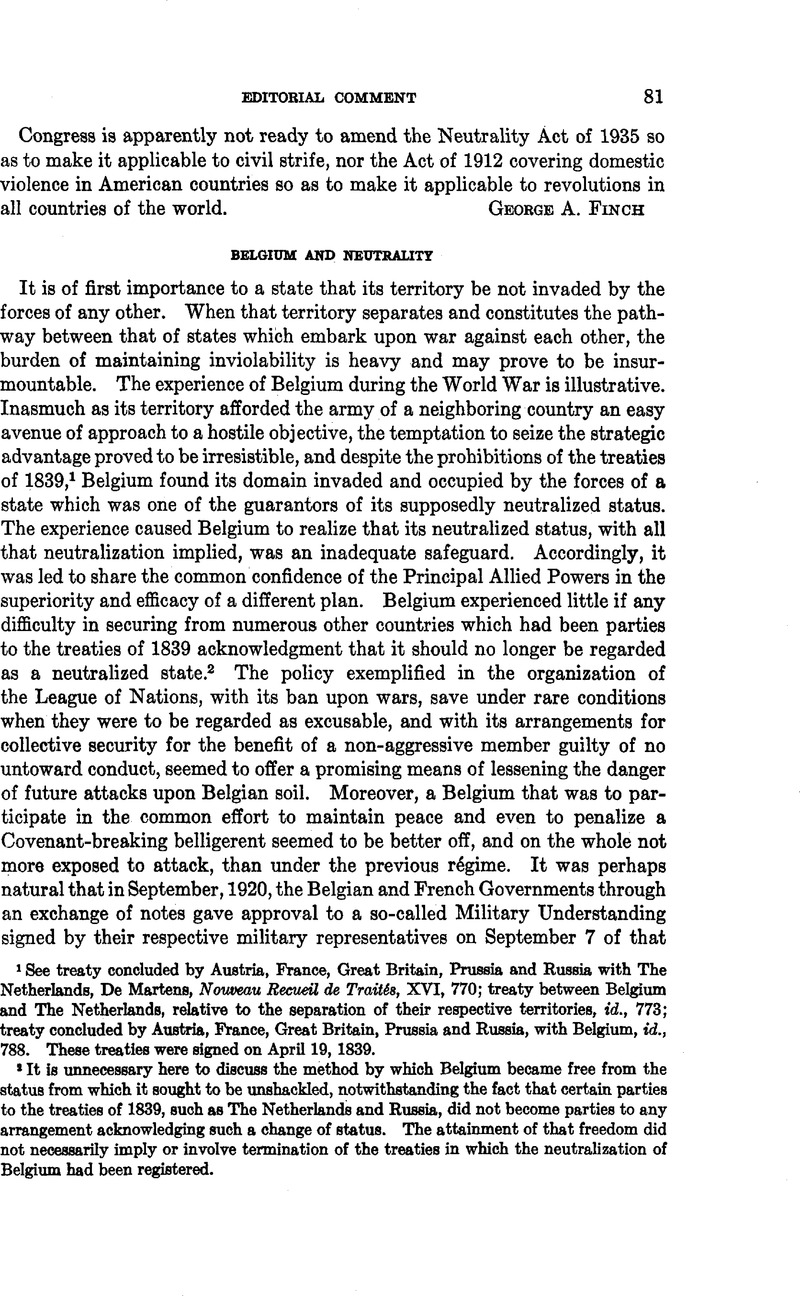Published online by Cambridge University Press: 12 April 2017

1 See treaty concluded by Austria, France, Great Britain, Prussia and Russia with The Netherlands, De Martens, Nouveau Recueil de Trains, XVI, 770; treaty between Belgium and The Netherlands, relative to the separation of their respective territories, id., 773; treaty concluded by Austria, France, Great Britain, Prussia and Russia, with Belgium, id.,788. These treaties were signed on April 19, 1839.
2 It is unnecessary here to discuss the method by which Belgium became free from the status from which it sought to be unshackled, notwithstanding the fact that certain parties to the treaties of 1839, such as The Netherlands and Russia, did not become parties to any arrangement acknowledging such a change of status. The attainment of that freedom did not necessarily imply or involve termination of the treaties in which the neutralization of Belgium had been registered.
3 See League of Nations Treaty Series, Vols. 2–3, 128.
4 The writer acknowledges his indebtedness to His Excellency Count Robert van der Straten-Ponthoz, Belgian Ambassador at Washington, for the text of an authentic copy of the King’s address. The English translation given above is chiefly that published in the New York Herald-Tribune, Oct. 15, 1936, p. 2.
It must be obvious that the King was far from suggesting the desirability of the resumption of a neutralized status for his country to be effected through the instrumentality of a multipartite agreement, and designed to reproduce a condition resembling that wrought through the agreements of 1839.
5 The cutting off of that right in so far as it may be attributable to or derived from a Belgian alliance with the enemy of a possible or potential invader, and the weakening of that disposition greatly strengthen both in a military and diplomatic way the position of the sovereign that can boast of such an accomplishment.
6 Declared the Manchester Guardian Weekly, Oct. 23, 1938: “When, in March of this year,Germany broke the treaty by marching into the demilitarised zone it was replaced by a temporary but binding agreement. By this Britain is bound to go to the help of either France or Belgium if they are attacked by Germany; France and Belgium are bound to go to the help of each other in the same case; but neither France nor Belgium is bound to go to the help of Britain. This agreement also would presumably be annulled by the acceptance of King Leopold’s declaration, as well as the military arrangements between the Staffs of the three countries that were designed to strengthen the obligations then assumed.
“This agreement, however, was not meant to be permanent, but represented only an ’interim agreement’ until a new pact should be negotiated for Western Europe. It was foreseen that should the negotiations to that end fail completely some such guarantee for France and Belgium would still be necessary, but the British Government insisted that if that should happen the guarantee must be reciprocal—that is to say, Belgium and France would have to come to the aid of Britain if she were attacked. So far the negotiations have not failed, or at least their failure has not been admitted; indeed, on September 18, Mr.Eden invited the five Locarno Powers (including Belgium) to a new conference. The proposed Belgian neutrality would not necessarily prevent a new Western Pact, for the other four Powers might agree to guarantee her neutrality without asking for reciprocal guarantees, as was the case before 1914. It would, however, prevent the suggested pact betweenFrance, Britain, and Belgium from coming into force if negotiations fail.”
7 It must, of course, be constantly borne in mind that the invasion of Belgian territory by any state is likely to be regarded as adding to the defensive requirements of some of its neighbors, and that at least one of them may be expected, in such contingency, on grounds of its own self-defense, to endeavor to repel the invader. Thus Belgium may need no affiance in order to become the beneficiary of such action. Cognizance must also be taken of another consideration. The attempt to strike a decisive blow in the shortest time against a state whose territory is contiguous to, or in the vicinity of, that of Belgium may assume the form of an aerial attack. If, in the course thereof, belligerent aircraft initiate flight over Belgian neutral territory, the offended sovereign, however incensed by such illegal action, might not in fact suffer as grievous harm as would be the case were a belligerent army to occupy the land. Nevertheless, any Belgian effort to repel by force the belligerent that merely sought transit by air over Belgian soil might be expected to induce an aerial bombardment designed to overcome all resistance.
8 “Disentanglement in Europe,” New York Herald-Tribune, Oct. 17, 1938.